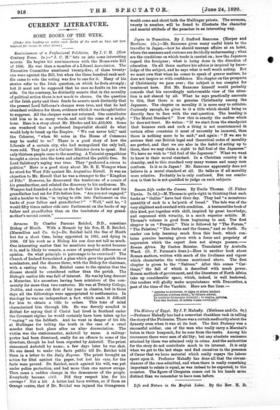Roman Life under the Cmsars. By Emile Thomas. (T. Fisher
Unwin. 7s. 6d.)—M. Thomas is quite right in thinking that such books as " Gallus " have had their day. They had "a monstrous quantity of sack to a ha'porth of bread." The tale was of the very slightest and overlaid with erudition. A businesslike book of this kind, put together with skill, inspired by great knowledge, and expressed with vivacity, is a much superior article. M. Thomas's volume is good from beginning to end. The first chapter is on "Pompeii." This is followed by "The Forum," "The Palatine," "The Baths and the Games," and so forth. No reader can help learning much from this book, which con- tains genuine learning given with a force and propriety of expression which the expert does not always possess.— Roman Africa. By Gaston Boissier. Translated by Arabella Ward. (G. P. Putnam's Sons.)—Here is another book about Roman matters, written with much of the liveliness and vigour which characterise the volume mentioned above. The first chapter is given to the "Natives." After this comes "Car- thage," the fall of which is described with much power. Roman methods of government, and the literature of North Africa take up considerable apace, which, indeed, is well bestowed. Our readers will gladly make acquaintance with Dracontius, a poet of the time of the Vandals. Here are fine lines :— " Agmlna te astrorum, te sign et sidera landant Auctorem confessa suum ; te fulmen adorat, Te tonitrus hiemesque tremnnt ; te stagna, naiades, Voce sue laudant, te nublia crassa coruseant."


















































 Previous page
Previous page